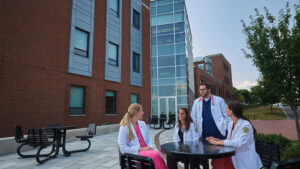Workload, Joys, and Advice for Students: What It’s Like to be a Rural PA

The idea of practicing medicine in a small town or rural community may conjure up images of close-knit relationships, long hours, and limited resources. But what is it really like to be a Physician Assistant in these settings? Two Le Moyne PA alumni, Jessica Dorsy ’19 and Kristen Sakoi ’13, recently shared their experiences working in rural New York. Here’s what they had to say about the challenges, the joys, and the advice they have for students considering a similar path.
Insights from Our PA Alumni Who Serve Rural Communities
One of the biggest differences between rural and urban medicine is access to specialists. In rural settings, PAs often manage conditions that might otherwise be referred out in cities. This means rural PAs need to be confident handling a broad range of cases.
“We try to do as much as we can before referring out because patients face long wait times and transportation issues,” Jessica explained. “For example, if a patient needs to see a specialist in Syracuse, it could be months before they get in, so we manage what we can in primary care.”
Both Jessica and Kristen see 16–20 patients per day, balancing a mix of chronic disease management, urgent care, and preventive medicine. One advantage of their roles is having an administrative day built into their schedules, allowing them to focus on paperwork, follow-ups, and professional development.
Rural patients often face significant challenges in accessing healthcare—from transportation to cost to insurance coverage.
Kristen shared a story of a patient who struggled to afford diabetes medication. “Mail-order pharmacies were an option, but the patient didn’t have a phone to set it up. Another patient had no car and relied on friends for rides to appointments. These barriers make delivering care more complex.”
Jessica echoed the importance of understanding a patient’s full situation—not just their medical history, but their financial, logistical, and social constraints. “We spend a lot of time explaining why referrals are necessary, helping patients figure out how to get to their appointments, and adjusting treatment plans based on what’s realistic for them.”
Despite the challenges, both Jessica and Kristen love their work. The deep patient relationships and sense of community make a huge difference.
“I treat entire families—grandparents, parents, kids. I love hearing life updates when patients come in,” Jessica shared. “There’s a strong sense of mutual respect. They know care is limited in the area, and they appreciate what we do.”
Kristen agreed, adding, “I feel like I know everyone in Canastota. It makes my job more meaningful because I see firsthand the impact of my care in the community.”
For students considering rural healthcare, both alumni had practical advice:
- Choose the Right Rotations: “Try to get a rural primary care rotation so you can see if this work is right for you,” Kristen recommended.
- Ask Smart Job Interview Questions: “Find out if your employer offers support for new grads, administrative time, and mentorship,” Jessica advised.
- Embrace Continuous Learning: “In rural settings, you’ll need to manage a wide range of conditions. Stay curious and keep expanding your knowledge,” Kristen added.
Take a Deeper Dive
Is Rural Medicine for You?
Being a PA in a rural community is not for everyone. It comes with unique challenges, but also deeply rewarding moments. If you’re passionate about building relationships, making a tangible impact, and working in a close-knit environment, rural healthcare could be an incredibly fulfilling career path.



